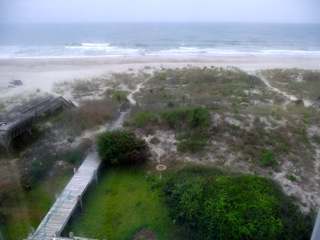Greetings from the Coastal Land Rights Project! We are excited to give you an update on our work battling injustices along our nation's coasts.
PLF fights for the Wills family
Eric Wills and his family own a modest beachfront mobilehome in San Clemente, California. They wanted to replace their aging home with a slightly smaller new one. Replacing a mobilehome is simple: jacks supporting the old home are removed and it is driven away. The new mobile home is rolled in, placed on new jacks, and bolted together. The whole thing takes less than a week.
But the California Coastal Commission insisted that the replacement of the Wills' mobilehome required a costly and time-consuming Coastal Development Permit -- a process that took about a year and tens of thousands of dollars.When their permit was finally approved, it came with a shocking condition: The Commission demanded that the Wills forever waive their rights to repair or replace the seawall that protects their beachfront property from erosion and other natural hazards. This outrageous condition not only puts the security and value of the Wills' home at risk, it also violates California's Coastal Act and both the California and U.S. Constitutions. After some investigation, PLF determined that the Commission has made similar demands of dozens of other property owners seeking permits in recent years.  PLF took on the Wills' case-pro bono, as always -- and briefing before the Orange County Superior Court is now complete. A hearing to set aside the unlawful permit condition will be held on July 14. A win in the Wills' case will stop the Commission's overreach and help secure the rights of thousands of coastal property owners throughout California who could face a similar threat. The case is Capistrano Shores Property, LLC v. California Coastal Commission. For more information read a recent news release and blog post by Larry Salzman.
Washington Court Puts Brakes on Expansion of the Public Trust Doctrine
 In Chelan Basin Conservancy v. GBI Holding Company, the Washington Court of Appeals issued an important decision limiting the expansive scope of the public trust doctrine. Broadly stated, the public trust doctrine limits development on private property if such development would hinder a public resource -- like water or shoreline. In Washington, the Shoreline Management Act has vigorously implemented the public trust doctrine, but the plaintiffs in Chelan Basin didn't think that the Act had gone far enough. They asked the court to declare illegal structures that antedated the Shoreline Management Act because of their effect on the public trust. If the plaintiffs had had their way, structures that had long been in place around the state would have been threatened with removal. The problem with the plaintiffs' argument was that the state had consented to the structures in place long before the Shoreline Management Act was adopted. The court agreed with PLF's argument and held that the Shoreline Management Act had already resolved the legal status of structures in place before it was adopted. PLF will be watching to see if the Washington Supreme Court takes review of this case. More information can be found on PLF's Liberty Blog. Coastal Commission targets agricultural land
 An ongoing case that we are watching in Los Angeles County raises an interesting issue concerning the Coastal Act and agricultural uses. As our readers know, the Coastal Act generally turns a dim eye to development. One of the rare exceptions to that attitude is found in Sections 30241 and 30242 of the Act. These provisions direct the Commission to preserve "prime agricultural land" and generally prohibit the agency from converting agricultural land to non-agricultural use. In 2014, the Commission approved a land use plan for the Santa Monica Mountains. Despite the mandates of Sections 30241 and 30242, the plan prohibits new agricultural uses on nearly 90% of the Mountains. Accordingly, in Mountainlands Conservancy v. California Coastal Commission, a coalition of area property owners who wish to use their land for agriculture, challenged the Commission's approval of the plan. A hearing on the case is scheduled for later this year. Given the dearth of judicial decisions interpreting Sections 30241 and 30242, this case has strong potential to set important precedent on the extent to which the Commission's aggressive no-development attitude must cede to the Act's protections for agricultural uses in the coastal zone.
|
And there you have it! As always, thank you for your support. We couldn't do any of this work without the help of donors like you! Please follow and like us on Facebook and Twitter.
|
Until next time,

Joshua P. Thompson Pacific Legal Foundation |
 |
|